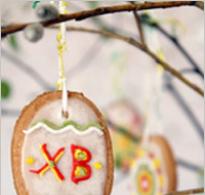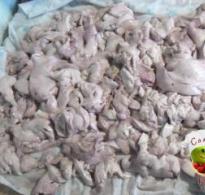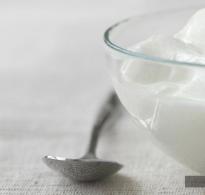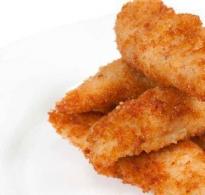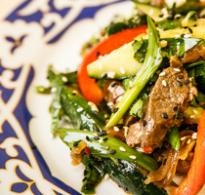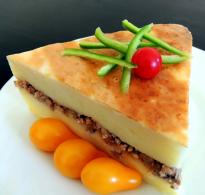Recipe: jujube in drunken syrup - a sweet and healthy preparation. Ziziphus - useful properties and recipes
Today it has become fashionable to have exotic and unusual cultures in your garden. One of these cultures among compatriots was unabi, the beneficial properties of which help to cope with many diseases. The plant has an unusual name - unabi or jujube. It is also known under the names of jujube, Chinese date, jilon, jida, choylonili anap, anab.
The beneficial properties inherent in jujube were known more than four thousand years ago in Northern China. Jujube is cultivated there to this day. Nowadays, the plant is well known to the inhabitants of Afghanistan, Pakistan, India, Japan, Australia, and the USA. It is grown both in Russia and Ukraine. The results of many years of research prove the possibility of adapting the plant to our climatic conditions.
Unabi is a low tree or bush up to 5 m high. The plant has an attractive decorative appearance at any time of the year, but jujube is especially beautiful during the growing season. Growing comes down not only to obtaining aesthetic pleasure, but also to harvesting. The fruits of jujube are small drupes with glossy skin, fleshy sweet pulp, which tastes a bit like dates. Usually unabi fruits ripen in September-October. During the ripening period, the plant resembles a New Year tree: the tree looks so beautiful, decorated with bright jujube fruits.
Unabi is a rather unpretentious plant, and the whole success of growing depends on what place you choose for the plant. He is most comfortable in sheltered from the wind, warm areas. In addition, the growth and development of the plant depends on the amount of light entering the site. If it is not enough, the yield will suffer significantly. Unabi is not afraid of drought and heat, and loamy soils are most suitable for him. It is very convenient that the plant is not damaged by pests, and in winter it can withstand frosts up to 25 degrees.
Useful properties of unabi
One of the main advantages of the Chinese date is its unique composition, which includes vitamins, beneficial trace elements, catechins, carotene, coumarins. Unabi fruits contain several tens of times more vitamin C than lemons, but dates are much more palatable. Eating several fruits of jujube a day, you can strengthen the immune system, replenish the body with calcium, magnesium, iron, sulfur and other elements necessary for normal functioning. 
The plant is able to retain useful properties in any form: raw, boiled, fried. For this, he was loved not only by doctors, but also by many culinary specialists of the world. It should be noted that unabi has a lot of medicinal properties:
- Dates and medicinal products based on them allow you to rejuvenate the body and cleanse it of harmful toxins and toxins. Unabi helps to remove cholesterol and excess fluid from the body;
- The fruits of jujube help to cope with poor health with high blood pressure;
- Chinese dates tone the body and improve appetite;
- The beneficial properties of unabi help the plant relieve inflammation. Due to this, dates are often prescribed for the treatment of bronchitis, colds, cystitis, nephritis;
- Ziziphus easily solves problems associated with the nervous system. A few fruits of the plant eaten will help overcome insomnia, calm down, relieve stress;
- Nutritionists recommend using the healing properties of unabi to all those who are on a diet. Dates are a low-calorie product, which nevertheless contains all the necessary minimum of useful substances - an indispensable tool. Among other things, the fruits of unabi control and normalize, if necessary, metabolism;
- With the help of jujube, most diseases of the gastrointestinal tract can be cured;
- The fruits of this plant can even cope with dermatological problems. Ointments and decoctions based on Chinese dates contribute to the speedy healing of purulent wounds, small cuts and abrasions.
calories
For 100 grams of jujube there are about 79 kcal (3.9% of the daily requirement).
The nutritional value
Vitamins and minerals
Due to the vitamin composition, unabi is a valuable fruit that strengthens the immune system, helps prevent premature aging, protects the body from infections and diseases.
Minerals in unabi have a beneficial effect on the functioning of the heart, nervous system, improve brain function, and help cleanse the liver.
The use of unabi has a positive effect on health at any age. And regular use of jujube will give the body new strength, energize and prevent many diseases.
Contraindications unabi
 Unabi helps to lower blood pressure, so hypotensive patients need to use it very limitedly or completely exclude it from their diet. In addition, the use of this fruit is contraindicated in pregnant women.
Unabi helps to lower blood pressure, so hypotensive patients need to use it very limitedly or completely exclude it from their diet. In addition, the use of this fruit is contraindicated in pregnant women.
Despite the fact that unabi is widely used in the treatment of diseases of the digestive system, its improper use can further exacerbate the problem. So, in no case should you eat fruits with a peel. In addition to the fact that it takes a long time to digest, it can also lead to damage to the walls of the stomach.
Unabi is a dietary product, but it can only lead to weight loss if it is consumed in a dosed manner. Uncontrolled consumption of the product in large quantities can lead to the opposite effect due to an increase in blood sugar levels.
How to take unabi?
- Unabi has a fairly wide range of uses. This fruit is especially effective in the treatment of various skin diseases caused by inflammation and infections. Due to the antibacterial properties of a decoction based on the bark and leaves of a tree, dermatitis, abscesses, skin tuberculosis, as well as deep and purulent wounds can be quickly cured. When applied internally, this decoction acts as a diuretic. If there are inflammatory processes in the mouth in the form of ulcers and wounds, then rinsing, applications or lotions are recommended;
- To calm a cough of bronchial origin, as well as to facilitate expectoration, it is useful to take a decoction of dried unabi fruits. In addition, this tool effectively eliminates dizziness and shortness of breath;
- Oriental women owe much to the unabi with their thick long hair. For these purposes, use a decoction of the rhizome of the tree. If the child's hair does not grow well, then the decoction should be regularly rubbed into the scalp. But for adults, this remedy helps to stop baldness;
- Unabi fruits are an invaluable product for strengthening blood vessels due to the high concentration of vitamins C and P. People suffering from hypertension and other vascular diseases should definitely include this product in their diet. With regular use of unabi, you will forget about dizziness, headaches, tinnitus and other unpleasant symptoms of vascular diseases;
- Unabi is a versatile remedy for both constipation and diarrhea. With its help, you can even cope with such a serious disease as dysentery. For people suffering from gastritis, gastroduodenitis and stomach ulcers, unabi fruits will be a real salvation.
Despite the fact that unabi is classified as a low-calorie, dietary product, the content of useful and nutritious substances in it is much higher than in many other fruits. By including unabi fruits in your diet, you can be sure that your body will receive all the elements necessary for normal functioning. In addition, the plant contributes to the normalization of metabolic processes, which accelerates weight loss. And if you taste the delicate, unusual taste of unabi, this fruit will soon become your favorite treat.
Unabi in folk medicine
Herbal decoction:
10-20 fruits of unabi per 500 ml of boiling water are boiled for 20 minutes, insisted for 1 hour, filtered.
Take 100 ml 3-4 times a day for anemia, smallpox, diarrhea, weakness, dizziness and dry cough, for diseases caused by a lack of vitamin B in the body, as a tonic and lowers cholesterol levels in the blood.
A decoction of the roots is used to stimulate growth and strengthen hair.
 Infusion preparation:
Infusion preparation:
1 st. l. crushed unabi leaves in 300 ml of boiling water insist 1 hour, filter.
Take 50 ml 3-4 times a day for hypertension, pulmonary diseases with cough.
Infusion wash the head to strengthen the hair and dandruff.
Tincture:
100 g of crushed unabi seeds per 500 ml of water are boiled for 10 minutes, 200 ml of 96% alcohol are added, insisted for 8 hours, filtered.
Take 1 tbsp. l. 4 times a day for neurasthenia, hysteria, dizziness, tachycardia, insomnia.
Ointment:
fresh unabi leaves are mixed with olive oil (1:5), heated to a temperature of + 90 ° C, infused for 10 days, filtered.
Used for tumors, abscesses, ulcers.
Fresh or dried unabi fruits are prescribed 20 pieces 3 times a day after meals (treatment course - 3 months) for hypertension.
Collection and preparation of unabi
 For medicinal purposes, leaves, fruits are used, very rarely the root and bark of the plant. The fruits should be harvested when they are fully ripe, the leaves when the plant bears fruit. You need to dry the leaves in the shade, best of all under a canopy in the air, you can in a room that is well ventilated, they must be laid out in one layer. You can store no more than one year.
For medicinal purposes, leaves, fruits are used, very rarely the root and bark of the plant. The fruits should be harvested when they are fully ripe, the leaves when the plant bears fruit. You need to dry the leaves in the shade, best of all under a canopy in the air, you can in a room that is well ventilated, they must be laid out in one layer. You can store no more than one year.
The fruits of the Chinese date can be used dried, dried and dried, it is good to make jam, marinade, compote, juice from them. They are also well used in the manufacture of confectionery. It is necessary to store them up to five days, no more.
It is best to dry the fruits in a dryer at a temperature of 65 degrees. You can store no more than two years.
Unabi (jujube) or Chinese date is sometimes erroneously compared with a real date due to external resemblance, but the first, unlike the second, is the fruit of a shrub, not a palm tree. Yes, and taste, and useful properties they have different. Unabi appeared on the domestic market not so long ago and has only been gaining popularity since then, as it has an excellent taste and is incredibly useful at the same time. Your attention is detailed information about the plant: properties, benefits and contraindications, reviews, as well as recipes on how to cook this plant.
Unabi (jujube): features, application
Unabi belongs to the family of buckthorn plants. Most often, this plant can be found in warm climatic zones. Unabi is ubiquitous throughout Europe, Asia and even Australia. The plant during the fruiting period produces small rounded fruits with a brown smooth glossy skin and juicy sweet pulp that is very pleasant to the taste.
Attention! You should be extremely careful with the leaves of the plant, because they have a slight anesthetic effect: even if you chew one leaf, there will be a slight paralyzing effect in the form of a temporary blockage of certain taste buds (sweetness and bitterness).
It is worth noting that fully ripe unabi fruits are quite fragile: at the slightest pressure, they can simply burst and after that they lose most of their useful properties. True, recently gardeners have gotten the hang of growing unabi in this way in order to keep its fruits intact.

unabi tree
Unabi fruits are widely used not only in cooking, but also in traditional medicine, and not only fruits, but also roots, leaves and even seeds can be used with benefit.
The benefits and harms of the plant
Speaking about the benefits of unabi, one cannot fail to note an important feature: the use of the fruits of this plant will certainly benefit your body, but only if you use them in a dosed amount and not too often.
If we single out the most significant effect of the fruits of this plant on the body, we can focus on the following:
- Effective treatment for hypertension. It has been noted that with regular use of dried unabi fruits (4-5) for several months (2-3) it is possible to get rid of high blood pressure for a long time.
- Restoration of the body's strength in beriberi and anemia.
- Effective cleansing of the body from unnecessary cholesterol, and with it all harmful substances (toxins, toxins, etc.).
- An excellent tool for eliminating depressive and neurotic conditions. Unabi fruits are considered to be one of the most effective antidepressants.
- Strengthening or increasing the body's immunity (after an illness or during a spring exacerbation).
- An excellent tool for increasing brain activity, which is especially important for those who are engaged in intellectual activities.

Unabi fruits are very useful fresh
- An excellent remedy for those who suffer from gastrointestinal upset, and also have disruptions in the hormonal system.
- Means for the prevention of diseases of the respiratory system, liver and heart.
Ointments and decoctions from the plant are actively used to treat dermatological problems, as well as skin injuries (cuts, burns, etc.).
Advice. A decoction made from unabi berries will help nursing mothers who have problems with breast milk, and the infusion will relieve insomnia.
As for contraindications to the use of this plant (any parts of it), it is better to refrain from using it for those who suffer from hypotension, intolerance to this product, as well as pregnant women.
The best unabi recipes
In addition to the fruits, various parts of the plant can also be used in a thermally processed form, most often in the form of a decoction and tea. To your attention are several recipes for making delicious and incredibly healthy decoctions and tea from unabi.
Advice. Keep in mind that the taste of unabi fruits can seem a little specific, so before cooking anything with them, it's worth trying a few fruits fresh.
Unabi fruit tea. To make tea according to this recipe, you only need 12-15 (depending on size) unabi fruits and 1 liter of boiling water. To give a special taste, you can add a little honey to slightly cooled tea. It is advisable to drink the prepared tea during the day. It will not only invigorate you and please you with a pleasant taste, but also reduce anxiety, calm your nerves and normalize sleep.
Decoction of unabi fruit can be used as an excellent prophylactic as well as for medicinal purposes, for its preparation you will need dried / fresh fruits of the plant. For 1 st. water is taken approximately 20-30 g of fruit. The crushed fruits must be poured with boiling water and insisted in a water bath for about 10 minutes. Then cool and filter. To do this, you can use a strainer or a double layer of gauze. Take 4-5 times a day, 100 ml.

Medicinal teas and decoctions are prepared from unabi fruits
By the way, you can cook decoction of unabi roots. It is perfect for hair care: they will become strong, obedient and thick. To do this, you need 100 g of roots to pour 1 tbsp. boiling water. Then cool and strain. Rub into the scalp.
This concludes our acquaintance with such an unusual and useful plant as unabi. Be sure to experience its healing power for yourself. Good luck!
The fruits of unabi (zizifuza) are called Chinese dates and French plums for their visual similarity with the fruits of the date palm. Meanwhile, this is a completely different plant, which is not related to either palm trees or plum trees, but is a tall shrub of the Krushinov family. Find out his photos and reviews, recipes on how to cook unabi berries, what useful properties and contraindications they have, from this article.
What is unabi
The exotic unabi shrub is widespread in the world, growing almost throughout Asia, in southern Europe, the Transcaucasus, Japan, the USA, Latin America, Africa and Australia. The real record holder for the cultivation of jujube is China. Here, about 200,000 hectares of land have been allocated for its planting.

Up to 30 kg of berries are harvested from one unabi bush
The unabi shrub blooms in June with small greenish inflorescences, and in October it pleases with berries, which are small fleshy fruits covered with a dense yellow or red-brown skin. Their loose, slightly greenish flesh tastes like sweet dried apples.
From one adult unabi bush, you can collect up to 30 kg of berries.
Thanks to its pleasant taste and a huge number of useful properties, unabi has found application in cooking, folk and scientific medicine.
Attention! The berries of shrubs growing on soils depleted in humus and in the mountains have the greatest value. The concentration of bioactive substances in such fruits is much higher than in fruits grown in gardens.

Unabi is used in both cooking and medicine.
In the countries of traditional growth of jujube, its fruits are pickled, dried, dried and frozen, and also stewed or consumed fresh:
- unabi is an essential component of Indian seasoning - chutney;
- in China, it is used as a filling for pies, and is also added to rice or sorghum dishes;
- in Central Asia, it is added when baking bread, after drying and grinding;
- In Korea, they make drinks from it, and in Southeast Asia they eat it with salt.
In addition to delicious berries, jujube shrubs use bones - to prepare medicinal infusions for headaches and dizziness, roots - for coloring and tanning the skin, as well as young leaves - in Indonesia they are eaten, preparing stews from them.

Unabi berries ripen in October
Benefit and harm
Jujube is a valuable berry that contains a lot of useful nutrients and is the leader in the amount of vitamin C and iodine.
Attention! During storage, the amount of ascorbic acid in the fruits of jujube increases. Dried berries retain vitamins for 2 years.
Jizifus berries are a unique dietary and medicinal product, their properties are almost as good as Eleutherococcus and ginseng. Its use provides:

Attention! In China, the fruits, seeds, roots, leaves of unabi are used to make dietary supplements.
In addition, the inclusion of unabi in the diet improves vision and weight loss; in lactating women, it increases lactation. Eating a few fruits of jujube is easy to get rid of a hangover.
Due to the anti-inflammatory and analgesic effect, decoctions and infusions of jujube leaves are used in the treatment of gum and throat diseases, purulent wounds, burns and dermatitis.

Unabi berries have anti-inflammatory properties
A contraindication to the use of zizufus is individual intolerance to the product, the presence of hypotension. It should be used with caution during pregnancy.
What to cook from unabi
In places of traditional cultivation of unabi, it is used to make various pastes, jams, compotes, teas:

Attention! Unabi jam has a pleasant slightly pear flavor and contains many vitamins.
If you puree the unabi berries infused in syrup by rubbing through a sieve, and then boil the resulting mass, you will get unabi jam.

Most unabi berries are grown in China
Ziziphus is an exotic berry with a huge amount of valuable vitamins. If you manage to buy its dried or fresh berries in the market or in the store, you should use one of the recipes presented to prepare a drink or dish.
Zyphius - video
Unabi berries - photo









The benefits of jujube (unabi) are widely used in traditional medicine recipes. One of the names of unabi is associated with this property - “breast berry”.
And the fact that in both countries you can taste unabi, which the author of the post did last year! I remember Unabi from my childhood in Sukhumi. Arriving in the Georgian village of Kheta, I did not hesitate to make inquiries about the unabi.

Ziziphus (unabi) is a plant of the buckthorn family. The jujube berries can be consumed fresh. Also, the fruits can be dried, dried and canned. Sometimes jujube is confused with a date, but unabi is the fruit of a shrub, and a date is the fruit of a palm tree.
With respiratory diseases, jujube and a decoction of its fruits will also help. In China, decoction and infusion of unabi fruits are used as a diuretic, and in Central Asia - for many infectious diseases and as a means to normalize blood pressure. In Korean medicine, the bark of unabi trees is used for pain in the stomach and intestines, the leaves are used to lower blood pressure.

Unabi - useful properties, recipes, application, description
What do Georgia and Malaysia have in common? Despite the fact that unabi is grown in areas from the Mediterranean to China, few people know about this unusual fruit and its healing properties. When fresh, they are somewhat reminiscent of apples, rather sweet, not sour, with an original flavor that appears brighter if the unabi is dried.
It seems that the name unabi entered the Russian language precisely from Georgian (and into it, in turn, from Arabic, according to Chubinashvili). In addition to vitamins and minerals, unabi contains a unique substance, jujuboside, which prevents the development of the tumor process, prevents atherosclerosis and hypertension (more).
For example, one of the Russian gardeners writes that unabi trees in the Stavropol Territory survived a 37-degree frost. But the tests in the Voronezh region were less successful. In 2010, I brought two prickly unabi branches to St. Petersburg for growing indoors.
Unabi - the tree of youth and health
Photo #1 is mine, from Georgia, #2 is a Chinese manufacturer of unabi. Photo #3-4 from my favorite Plantarium. I tried unabi in Sukhum, I haven’t seen it anywhere else. In the winter of 2006, our T dropped to -31.2, and this was the only year when the trees were frozen to the level of snow. They recovered in about 2-3 years and now give the same harvest.
jujube or chinese date or unabi
There are other names for these fruits: "unabi", "jujuba", and also "Chinese date". In large quantities, berries are common in Asia, Europe, Japan and Australia. Most often, the plant can be found in areas with sunny slopes of mountains and hills.

It is also used as a tonic and diuretic. The composition of the fruit includes a large amount of ascorbic acid, which increases and strengthens the immune system. In addition, vitamin C helps the body resist the effects of viruses and infections.
For the treatment of various diseases, not only fruits, but also other parts of the plant are used. It is recommended to include jujube berries in the diet for people who have problems with the liver and hypertensive patients. In addition, the fruits are useful for bronchitis, tracheitis and some throat problems. If you prepare a decoction based on leaves and bark, then it can be used for lung diseases, as well as lotions for skin problems.
Harm jujube (unabi) can bring people with individual intolerance to the product. Pregnant women need to limit the number of fruits and refuse infusions and decoctions from the plant.
jujube - The most interesting in blogs
The fruits of the jujube shrub are oblong, fleshy, with a stone and a dense shiny skin, have a delicate and pleasant taste. It is also noteworthy that jujube is surprisingly useful, not only berries are used for therapeutic purposes, but also seeds, bark, leaves and roots of the plant. Ripe jujube berries are quite fragile, the peel quickly bursts and the jujube begins to deteriorate, losing its beneficial properties.
Recipes for cooking with photos
According to the content of vitamin C, jujube is ahead of lemons, it also contains carotene, tocopherol, thiamine and riboflavin, flavonoids. The use of unabi fruits helps to rejuvenate cells and cleanse the body of cholesterol, toxins, harmful metals, and excess fluid. In nursing mothers, unabi increases milk production, improves its quality.
The benefits of jujube (unabi) and treatment
The anti-inflammatory and diuretic properties of jujube are used in the treatment of diseases of the genitourinary system: cystitis, nephritis, urolithiasis. To prepare a decoction, take 5-10 unabi fruits, pour boiling water (half a liter) and boil in a water bath for 30 minutes. Then they are cooled, filtered, the fruits are squeezed, brought to the initial volume with boiling water.
A decoction of the roots of the plant is used as a strengthening agent for hair, rubbing it into the scalp, you can not only restore hair, but also prevent baldness. Also, the fruits can be used as a tonic and sedative. Varieties Varieties of unabi are divided into three groups according to ripening time: early (fruits ripen in late September - early October), medium (second decade of October) and late (late October - early January).
Unabi is eaten fresh and dried. Unabi are propagated by seeds and grafting. Take 1 ball ”- For long-term healing sores, brew the unabi fruits in water and often wash the affected areas with a decoction. In China, a lot of fruits are dried. Dried fruits taste like dates, hence one of the names of unabi - “Chinese date”. Unabi blooms in June and blooms, depending on conditions, from 1 to 2 months.
Today we will talk about unabi… Do you know this? Then about jujube. Also no? Maybe then the name "Chinese date" will tell you something? In general, again on the site the site is replenished with the heading “Useful exotic” and our conversation about the beneficial properties and contraindications of unabi.
What is unabi, how and where it grows, photo
Unabi- this is a well-known exotic fruit, which is popularly called Chinese date or jojoba. It is also called jujube or jujube. This plant belongs to the Krushinov family, which has about 50 species of representatives.
Unabi is a tree that can reach a height of 9 meters. It has a powerful crown and a strong, branched root system. You can distinguish a young unabi tree from an old one by the presence of thorns on it. Young trees have thorns, they crumble over time.
The fruits are ready for use by the end of the first month of autumn - September. Behind their shape, the unabi fruits are similar to, only these are larger in size. The diameter of one Chinese is 4-6 cm.
Unabi berries (if you can call them that) have a red-brown color, sometimes they can resemble the color of dark chocolate. The taste can be both sour and sweet, and sweet and sour varieties of unabi are often found.
Inside, the fruits have a fine-grained texture, similar to coarse flour. The plucked fruits, after lying down for a certain time, acquire a peculiar smell that cannot be compared with anything.
In nature, one copy of the unabi tree was found, which is 300 years old. However, it can only bear fruit for the first 45-55 years. The tree is not so whimsical, it can tolerate both hot weather and slight frosts.
Composition, calorie content of unabi
All over the world, unabi fruits are especially valued for their nutritional properties, they also have many medicinal properties and are very useful for various kinds of diets.
Unabi are rich in sugars, which contain about 30%, as well as proteins, amino acids and fats. Vitamin C in 100 g of the product contains almost 10 times more than in oranges and other citrus fruits. Substances no less useful for the body - minerals, are also contained in unabi in fairly impressive quantities. For example, calcium, potassium, iodine, iron, magnesium.
Useful flour is prepared from the fruits of this tree, used in baking shops. Often they are prepared as an independent dish, in the form of baked or boiled unabi fruits. They mostly come to us in the form of dried fruits or as canned food.
Before sending unabi fruits to store shelves, manufacturers douse them with sugar or honey syrup to give them an appetizing appearance and an unusual pleasant taste.
Calorie content of unabi fruits is 80 kcal per 100 grams of product.

Useful properties of unabi
Unabi fruits are consumed by both adults and children. They help to rejuvenate the skin and cleanse the body of toxins and toxic substances. Unabi fruits also contribute to bringing the central nervous system into tone and have a slight analgesic effect. Basically, jujube is used as an anesthetic and.
The leaves of the unabi tree, like its fruits, have medicinal properties. On their basis, folk healers prepare decoctions that treat diseases of the genitourinary system. For colds, it is customary to prepare a decoction and take it along with unabi fruits.
Scientists have proven that unabi does not lose its healing properties even after heat treatment. Many housewives who had to get acquainted with the benefits of unabi fruits prepare it for the winter in the form of conservation (jams, preserves, compotes and uzvars).
Unabi is not contraindicated for lactating and pregnant women, rather, on the contrary, the fruits contribute, and during pregnancy it facilitates the course of toxicosis.
Not only fruits and leaves have medicinal properties, even the unabi root has usefulness, for example, it is used to accelerate hair growth in young children. And adults use the roots in the fight against curls.
As a decoction based on the fruits of Chinese jujube is used, it can also be taken for dizziness and whooping cough.
Contraindications unabi - harm
Despite the fact that unabi fruits are rich in many medicinal properties, they have some contraindications.
For example, people suffering from low blood pressure should not get carried away with the fruits of unabi. Because they have the ability to reduce it.
Pregnant women should not take medicines based on the seeds of this plant.
It is necessary to carefully control the intake of jujube fruits, otherwise there is a possibility of allergic reactions and hypervitaminosis.

How to use unabi, quantity
The most famous healing property of unabi is its ability. Due to this, doctors recommend taking it to hypertensive patients, but be sure to take the fruits in a course and following the doctor's instructions.
Basically, with hypertension, patients are prescribed a decoction of the fruits of jujube or dried fruits of this plant, in the amount of 7-8 pieces three times a day. If you take them in smaller quantities, respectively, and the effect will be less pronounced.
As a general tonic, unabi is useful to take 10 pieces twice a day. Such strengthening of the body should be carried out twice a year, a course of two months.
The seeds of the unabi tree also have healing properties, which have a slight sedative effect on the nervous system. Therefore, they are recommended for admission with various kinds and nervous disorders.
What else is the use of unabi - jujube
To prepare an infusion of jujube leaves, you need to take three pinches of crushed, dry leaves, put them in a convenient container and pour 250 ml of boiled water. Insist and drink a couple of dessert spoons in the morning and evening.
The fruits of this tree should ideally be eaten fresh, since dried or dried fruit significantly increases the amount of carbohydrates. Which is bad for blood sugar levels.
For those who just love unabi and treat milk well, you can combine two useful products. It is very useful to make it for breakfast. Eat 10 fruits of jujube with warm milk. This will help energize for the whole day and in a good mood.

What is the difference between dates and unabi
Unabi, aka Chinese date, jujube and jujube, can sprout not only as a tree, but also as a bush. The fruits of jujube have an oblong, sometimes spherical shape. The size of the unabi fruit can reach the size of a chicken egg. The stone that is inside the fruit does not have such a strong shell as the bones of many other fruits.
The ordinary date, which everyone is used to seeing on the shelves of supermarkets, is very similar in taste to the Chinese date. The main difference between them is in the bone. In unabi fruits, the stone is more fragile and has slightly sharp edges. In common dates, it is more rounded and durable.
Unabi - how to grow from a seed
When buying unabi fruits, many people wonder if it is possible to germinate this plant at home. Yes, it is possible, but it takes a lot of effort, time and, of course, patience.
If the fruits were bought in winter, you need to remove the seeds and put them in storage in a dry, dark place, it is desirable that the temperature is not lower than 10 degrees. They should lie for about a month, this process is called stratification. Some plants need time up to six months, a month is enough for jujube.
But, before putting the bones in storage, they need to be soaked in water for one hour, the water temperature should be 30 degrees. All the following days, you need to wash the bones so that they do not become covered with mold, which loves moist pulp so much (it can remain on the bones with insufficient cleaning).
The best time to plant unabi seeds is when the corn begins to sprout. Most often this happens in the first half of May. To sow the seeds, you need to make a small oblong depression in the ground, and place 2 seeds in this recess at a distance of approximately 15-20 cm from each other.
After the bones are laid, you need to lightly sprinkle them with earth and mark the beginning and end of the row with chopsticks. The main conditions for the successful germination of unabi fruits are a place well lit by the sun. If the sun in the morning and afternoon shines well on this site, this can guarantee that the sprouted bones will grow, and, in the future, will become full-fledged prolific shrubs or trees.

